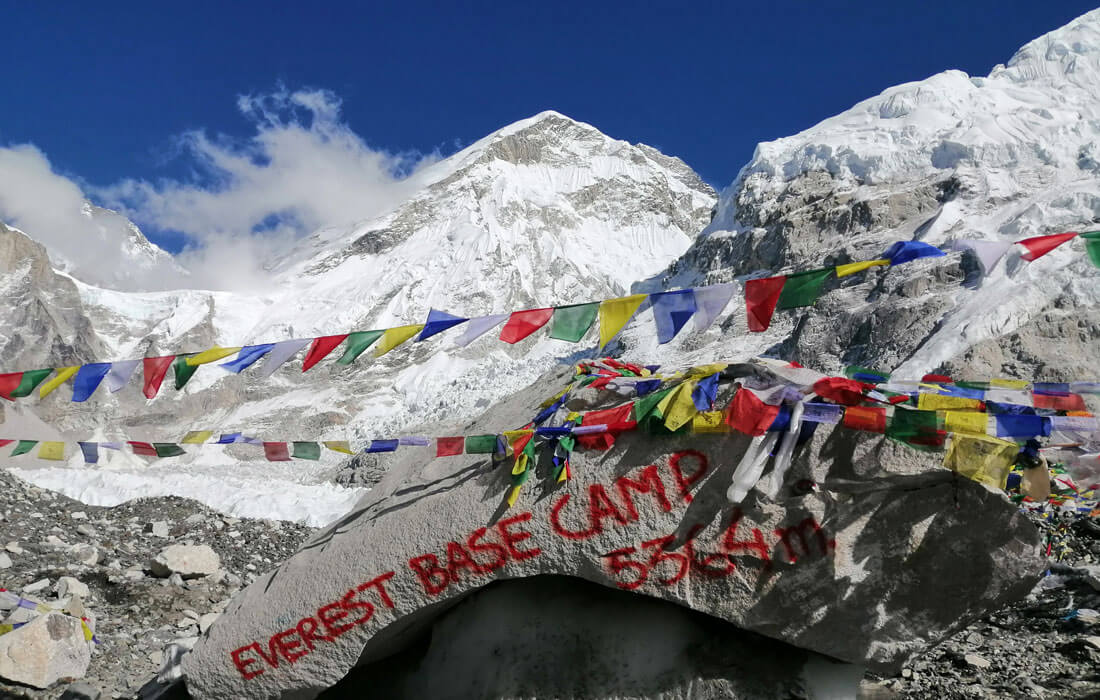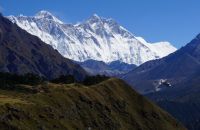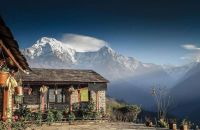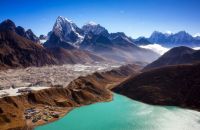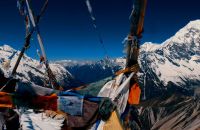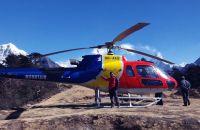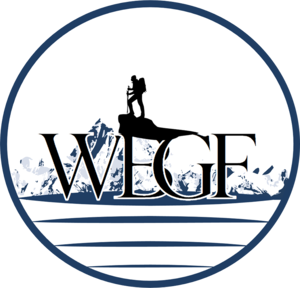Talk with our local travel specialist who can help organize your trip.
Everest Base Camp Trek : Your Ultimate 2024 Guide
Trekking to 5,550m/18,204ft0 at its highest point (Kala Patthar), the two weeks Everest Base Camp trek (EBC trek) is the most loved and popular trekking route in the World. This amazing adventurous journey takes you around the foothills of the renowned World's highest peak, Mt. Everest (8,848.86m). The major attraction of the EBC trek is Kala Patthar, which is also the most accessible point to view Mt. Everest and Khumbu Icefall.
Starting the trek at Lukla takes 8 days to reach the base camp and 3 days to get back to Lukla. The trail passes through Namche Bazaar, a famous tourist hub and trading center of the Everest region. As the trek continues, it will go through several enchanting Sherpa settlements like Tengboche, Dingboche, Lobuche, and Gorak Shep. The last stopover for the trek is Gorak Shep, which has access to both Everest Base Camp and Kala Patthar.
From the Kala Patthar viewpoint, apart from the magical view of Mount Everest, the magnificent view of Lhotse, Nuptse, Cho Oyu, Ama Dablam, Pumori, Thamserku, etc. will also leave you stunned. The trek lets you experience and explores the Khumbu region's rich Sherpa culture and tradition, along with glorious mountain views.
However, we have several separate articles regarding the EBC trek on our resource page. Still, in this handy ultimate guide, we include all the information you need to know before embarking on Everest Base Camp. Thus, read our ultimate guide for Everest Base Camp Trek with detailed information on the best time, how to get there, what to pack, and more.
Table of Content
- Why Is Everest Base Camp Trek Famous?
- How To Go To Everest Base Camp?
- Everest Base Camp Trek Distance
- Everest Base Camp Trek Duration
- Everest Base Camp Trek Elevation
- How Difficult Is Everest Base Camp Trek?
- How Much Does It Cost To Go To EBC?
- When Is The Best Time For The Trek?
- Accommodation On The Everest Base Camp Trek
- Food On The Everest Base Camp Trek
- Electricity And Internet Service
- Packing List For EBC Trekking
- Travel Insurance
- Everest Base Camp Trekking Permits
- The Alternative Trekking Route to EBC
- Lukla Flight Diversion To Ramechhap
- Everest Base Camp Heli Tour
- Is A Solo Trip To Everest Base Camp Possible?
- Conclusion
Why Is Everest Base Camp Trek Famous?
Everest Base Camp Trek takes you to the base of the World's highest peak, Mt. Everest. Also, there is a famous saying that the journey counts more than the destination, which applies to the Everest Base Camp trail. It is renowned for its spectacular mountain vistas, including Mt. Everest.
Here are some popular reasons why Everest Base Trek is famous among trekkers around the World;
- An exciting short and scenic flight to the World's most extreme Lukla airport
- A pleasant walk through the Sagarmatha National Park and spot some rare wildlife species such as Musk Deer, Snow Leopard, Himalayan Thar, etc
- Crossing high suspension bridges, colorful prayer flags, mani walls, and chortens
- Explore the colorful Sherpa town of Namche Bazaar
- Ancient Buddhist monasteries in Tengboche and Khumjung Monastery
- Astonishing views of some world's tallest peaks above 8,000 meters, such as Mt. Everest (8,848.86m), Mt. Lhotse (8,516m), Cho Oyu (8,188m), and Mt. Makalu (8,485m)
- Magnificent Khumbu Glacier, one of the World's highest glaciers
- Hike to the Everest base camp (5,364m), the lap of the World's highest peak Mt. Everest
- Incredible panoramic sunrise view from Kala Patthar (5,644m)
- Immerse yourself into the authentic local Sherpa culture and lifestyle
How To Go To Everest Base Camp?
There are two options to get to Everest Base Camp: trekking or a direct helicopter flight tour. Most travelers prefer trekking as it is more budget-friendly, and they get plenty of time to explore the Himalayas. The trek starts from Lukla, and from there, it will take 8 days to reach Everest base camp, including two acclimatization days at Namche Bazaar and Dingboche.
With the help of the map below, you can take an idea of the general trek route of Everest Base Camp;
Everest Base Camp Trek Distance
The total trekking distance from Lukla to the base camp is 65 kilometers. So, both ways, the trekkers will cover around 125 kilometers. However, the Everest base camp trek distance from Kathmandu is 155 kilometers.
Everest Base Camp Trek Duration
The normal duration of the Everest Base Camp trek is 14 days (two weeks). Also, it might depend on the trekker's fitness level, acclimatization days, weather conditions, etc. Sometimes, it might take over two weeks or less than 10 days. The walk duration varies from 6 to 7 hours per day on average. At the same time, some days are short, where you have to hike for 3 to 4 hours. Also, some are the longest days, with an average of 8 to 9 hours of hiking.
Everest Base Camp Trek Elevation
The Everest Base Camp elevation is 5,364 meters. The highest trekking point is Kala Patthar, at an altitude of 5,644 meters. Similarly, the trek's lowest starting point is Lukla, at an altitude of 2,840 meters.
How Difficult Is Everest Base Camp Trek?
Everest Base Camp Trek difficulty level is moderately challenging and equally rewarding. Basically, the trekkers will hike on average 6-7 hours per day with a light day pack. The trekking route involves rocky terrain, steep uphills, and downhills. So, it is essential to be in good shape and health. Physical exercise such as jogging, swimming, cycling, hiking, etc., will help to build stamina.
However, novice trekkers with average fitness levels can complete this trek, but those who are physically fit can enjoy it more. Previous trekking or hiking experience will be a bonus point, but no technical experience and mountaineering skills are necessary for this trip. Also, people with medical issues such as heart, lung, and blood sugar should consult with their doctor before booking the trek.
Since the EBC trek is a high-altitude trek, some people may feel the symptoms of altitude mountain sickness (AMS). Some common symptoms of AMS are nausea, headache, dizziness, shortness of breathing, increased heart rate, etc. If you get the symptoms of altitude sickness, you need to take care properly; otherwise, your life will be in danger. Some common preventions against AMS are drinking lots of water, ascending slowly, acclimatizing properly, getting plenty of rest, and consuming enough food. Also, after feeling the AMS symptoms, it is recommended to descend lower altitude immediately.
Featured Trips
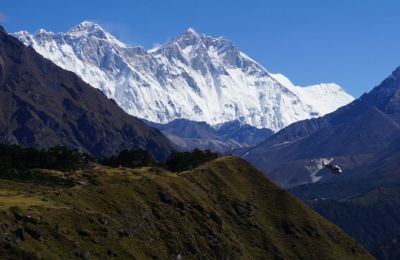
Everest Base Camp Trek - 14 days
Looking for an exciting Himalayan experience? Join us on our 14 day Everest Base Camp Trek - get ready to be stunned by breathtaking views and discover magical Nepalese cultures!
Inquire Now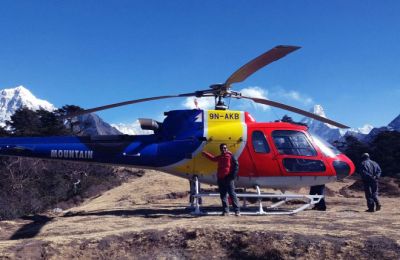
Everest Base Camp Luxury Trek with Helicopter Flight - 11 days
Take an extraordinary journey and explore majestic Mount Everest with a once-in-a-lifetime Everest Base Camp Trek. Enjoy the sights of local Sherpa culture along the way before soaring back down to Kathmandu in a helicopter return.
Inquire Now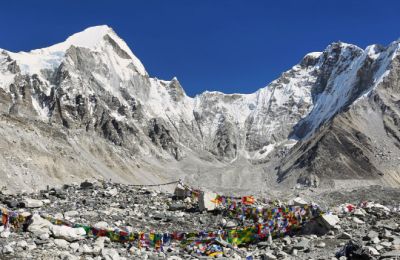
Everest Base Camp Short Trek Heli Return to Lukla - 12 days
Everest Base Camp Short Trek takes you across the highest trekking trail on Earth. Fulfill your lifelong dream to Trek Everest Base Camp and return from Kalapatther to Lukla.
Inquire NowWhere to travel next?
Get help from our travel specialists for holiday ideas that matches your interests.
How Much Does It Cost To Go To EBC?
Everest Base Camp Trek cost highly depends on the number of travelers, number of trekking days, and services/amenities you opt for during the trek. The cost generally lies between $1100 to $4500, which includes trekking permits, domestic flights (Kathmandu-Lukla-Kathmandu), a professional trekking guide, a porter, and accommodation, meals (Breakfast, Lunch, and Dinner), etc. The luxurious trekking package like the Everest Base Camp trek with a return helicopter flight will cost a little higher than the standard package.
When Is The Best Time For The Trek?
Like other best trekking seasons in Nepal, the best time to visit Everest Base Camp is during the pre-monsoon season of Spring (March - April - May) and after the monsoon season of Autumn (September - October - November).
During the spring and autumn seasons, the weather is favorable with the warm temperature and less rainfall, and the mountain views are perfect. However, during peak trekking seasons in Nepal, the Everest Base Camp trail is flooded with trekkers. Flight tickets are not readily available, and accommodation on the route is fully packed.
Besides, the winter and summer treks are still possible, but trekkers don't prefer this time because of the cold temperature, and the trails are also packed with snow. So, if you want to avoid crowds, we recommend you hike the base camp of Mt. Everest during the summer. So, you'll encounter a few trekkers and immerse yourself in the beauty of the Himalayas.
Accommodation On The Everest Base Camp Trek
Everest Base Camp trail offers a wide range of accommodations, from friendly tea houses to luxury hotels. Generally, there are some luxurious hotels and local guest houses in the lower land like Lukla, Phakding, and Namche Bazaar. The luxury hotels have excellent quality services with high-standard accommodation facilities, electric blankets, room heaters, hot showers, and free WiFi around the hotel premises. Afterward, mostly settlements at higher elevations like Dingboche, Lobuche, and Gorak Shep have teahouses providing basic facilities to trekkers. The accommodation service is essential, with rooms designed with two single beds, good mattresses, bedsheets, blankets, and pillows for comfort.
Food On The Everest Base Camp Trek
EBC trail is one of the established trekking routes in Nepal. So, you don't have to compromise on the food as you'll get almost all types of cuisine, from traditional Nepalese and Sherpa dishes to international dishes. You'll get various options from typical Nepali Dal-Bhat set, Sherpa stews, soups, and fired rice to Chinese and continental dishes like noodles, momos, spaghetti, pizza, pasta, spring rolls, steaks, etc. Namche Bazaar and Lukla have some of the finest bakery cafes and restaurants offering fresh bakeries and barista coffees. In addition, some tea houses serve vegetarian, vegan, and gluten-free meals if you notify them in advance.
Electricity And Internet Service
Everest trail is one of the renowned and established trekking routes in Nepal. You'll get all essential amenities en route to Everest Base Camp. Thus, the electricity and internet facilities are quite good compared to other trekking regions of Nepal. There is a regular electricity facility until Pangboche; after that, most teahouses use solar power, so they will take a few bucks to charge electronic devices. Likewise, there are different ways to use the internet during the trek. You can buy a local SIM card or get the WiFi facility inside the teahouses. Some of them might charge extra costs. You can also buy an Everest Link Card, which will help you to access the internet.
Packing List For EBC Trekking
Before heading towards the EBC journey, it is essential to have the correct packing list. Everest Base Camp trek covers two climatic zones: temperate and alpine. Some days you'll spend at a lower altitude where the temperature is warm. While close to the base camp area in the alpine climatic zone, the temperature is cold. So, it would help if you had something warm enough for these high-altitude environments. Also, the layering of clothes helps to survive during the trek. It can get freezing during night and morning, even during warmer months of the year.
Moreover, hiking boots are a good choice as they provide good support and traction on steep climbs. Also, you can check our page packing list of trekking in Nepal for general ideas about trekking packing lists. It also contains many handy packing tips you should know before leaving for your trek.
Travel Insurance
You must get the best travel insurance when trekking at a higher altitude. Everest base camp trek is a high-altitude trek that takes you to an altitude above 5,000 meters. So, a hike can be pretty hazardous, and you might face any unfortunate consequences during the trek, so travel insurance is essential if you plan to trek the base camp.
While trekking to the base camp, you might face serious problems such as altitude sickness, injuries, harsh weather, and flight cancellation. So, travel insurance will give you peace during the trek. You need to take trekking travel insurance with helicopter rescue as well. Most importantly, make sure your travel insurance coverage is up to at least 6000 meters, as you'll be spending at least 3-4 days over an altitude of 5000 meters.
Featured Trips

Everest Base Camp Short Trek Heli Return to Lukla - 12 days
Everest Base Camp Short Trek takes you across the highest trekking trail on Earth. Fulfill your lifelong dream to Trek Everest Base Camp and return from Kalapatther to Lukla.
Inquire Now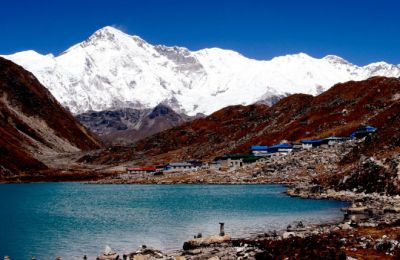
Gokyo Ri and Everest Base Camp Trek - 15 days
Embark on an incredible journey to the highest mountain in the world and explore its stunning beauty! Experience Gokyo Ri and Everest Base Camp trek to witness spellbinding views of Mt. Everest.
Inquire Now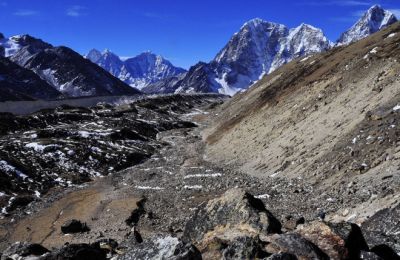
Jiri to Everest Base Camp trek - 21 days
Jiri to Everest Base Camp trek is a classic trekking trail to the foot of the world's highest mountain, Mount Everest. Kala Patthar at 5,550m is the highest point of this trek.
Inquire NowWhere to travel next?
Get help from our travel specialists for holiday ideas that matches your interests.
Everest Base Camp Trekking Permits
For trekking any route in the Everest region (including Everest Base Camp, Gokyo Lakes, and Three Passes), you need to obtain two permits;
Khumbu Rural Municipality Permit
Cost for Foreign Nationals: NPR 2,000 per person (for the first four weeks) and NPR 2500 per person (beyond four weeks)
The rate of permits is the same for all foreigners, including SAARC nationals and non-resident Nepali. You can get the permit at Lukla, and if you are starting from Phaplu, you can get it from Sagarmatha National Park Counter in Monjo.
Note: As the local government issues this permit, you can't get this permit in Kathmandu.
Sagarmatha National Park Permit
|
Cost for Foreign Nationals: |
NPR 3,000 per person |
|
Cost for SAARC Nationals: |
NPR 1500 per person |
|
Children below 10 years: |
Free |
You can obtain this permit at Tourist Service Center Bhrikuti Mandap, Kathmandu, or Sagarmatha National Park Entry Point in Monjo.
Documents required: For both trekking permits, all you need is your passport details. If you're trekking through a travel agency, they will help you arrange these permits.
Lastly, if you are doing Everest Base Camp Trek via Jiri, you need an additional Gaurishankar Conservation Area Permit, which will cost NPR 2000. You can take it from Tourist Service Centre Bhrikuti Mandap, Nepal Tourism Board, Kathmandu, or Gaurishankar Conservation Area Permit (GSCAP) checkpoint in Shivalaya.
The Alternative Trekking Route to EBC
There are multiple trekking routes leading to Everest Base Camp. If you want to have a short, you must take the classic Lukla route (direct flight from Kathmandu). It is an ideal and the most preferred trekking route to the base camp. But if you want long and discover more about Nepal's Himalayas, there are other alternatives way too.
The most popular alternative route is the Everest Base Camp Trek via Jiri, where you can enjoy the beautiful countryside of Jiri. Moreover, the alternative to flying to Lukla is choosing the trail via Phaplu to Everest Base Camp entirely on foot. However, it can cost you an extra week to travel. Also, there is another relatively less popular route from Tumlingtar that goes through the stunning Arun Valley to Everest Base Camp.
In addition, if you want to explore more areas of the Khumbu region along with the Everest Base Camp, then you can also opt for Everest Three Passes Trek, which will allow you to enjoy the three high passes: Renjo La (5,360m), Cho La (5,420m) and Kongma La (5,535m). Also, the Everest Base Camp trek with the Gokyo Lakes offers an opportunity to enjoy the famous Gokyo Lakes.
Lastly, if you are one of the climbing enthusiasts and want to experience peak climbing with the EBC trek, then you can opt for Island Peak Climbing with EBC trek or Lobuche East Climbing with EBC, Renjo, and Cho La Pass Trek. The choice is yours!
Lukla Flight Diversion To Ramechhap
In rare cases, the Lukla flight is diverted to Ramechhap (Manthali Airport). Most of it is redirected to the Manthali airport during the peak trekking seasons like Autumn (September to November) and Spring (March-May) because of heavy air traffic and ongoing construction work on TIA Domestic Terminal. Generally, it doesn't change anything on the trek itinerary. It will take around 3-4 hours to drive to Ramechhap. From Manthali airport, it will take about 15-20 minutes to Lukla Airport from Ramechhap.
Note: Currently, Lukla flight is being operated by Kathmandu directly. But during peak seasons like Spring and Autumn, the flight might be diverted to Ramechhap. So, we will keep you posted on any flight-related updates.
Everest Base Camp Heli Tour
Heli tour to Everest Base Camp is getting popular and more expensive than the regular trek. However, it is also the fastest and most convenient way to explore the Everest region of Nepal. There are many helicopter tour packages, including Luxury Trek with Helicopter Flight. You can check the details by clicking the above link.
Is A Solo Trip To Everest Base Camp Possible?
Trekking solo to Everest Base Camp trek is possible but not generally recommended. It is easy to navigate until Namche Bazaar, but afterward, the trail gets less busy, and chances of getting lost on the route. So, trekking in a group with a guide is the safest option for a high-altitude trek like EBC. On the way, you might face the problems of altitude sickness, injuries, and other consequences. During this unfortunate situation, a local guide will help and guide you on the route. Not only this, but they will also help you to get the best accommodation services, especially during the peak season. They will pass on the information regarding the trekking route, mountain lifestyle, and their culture and take care of your needs and well-being.
Conclusion
Undoubtedly, the Everest Base Camp trek draws the attention of most trekkers, and for a good reason. It is worth exploring the grand mountain scenery, authentic Himalayan people, Sherpa culture, and lifestyle will definitely provide a lifetime experience. So, this ultimate guide for the Everest Base Camp trek will help you to plan your next dream trip. We tried to include all the necessary information you need for the Everest Base Camp trek.
- Written by: Sudina Manandhar
Updated: Nov, 16, 2023

